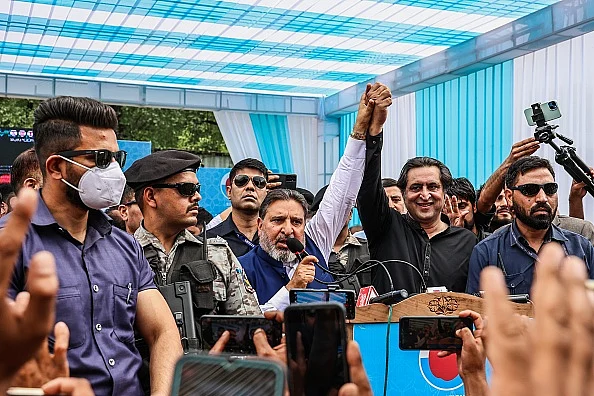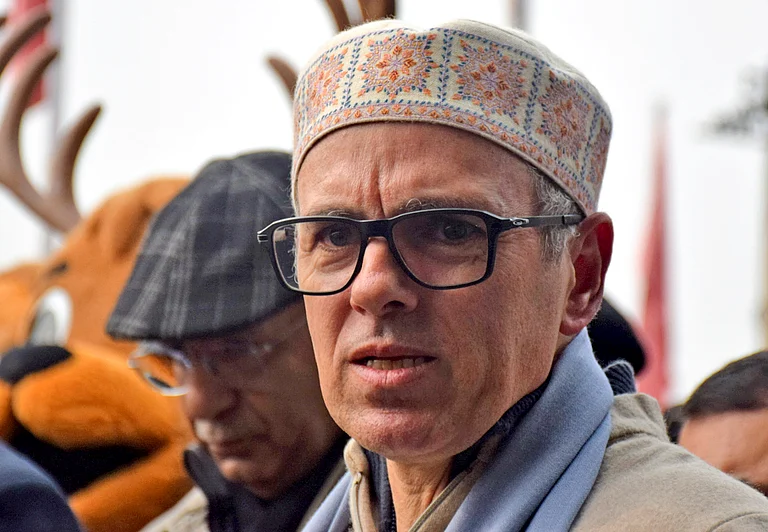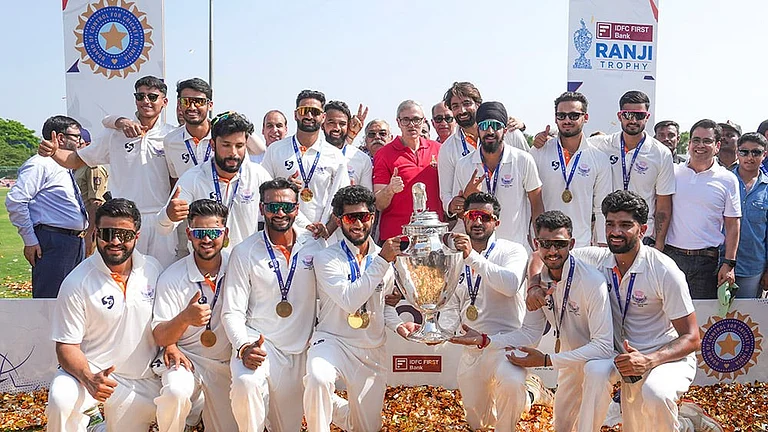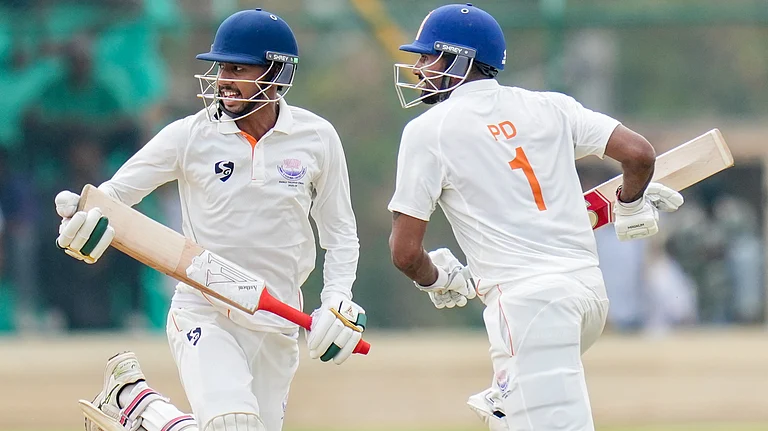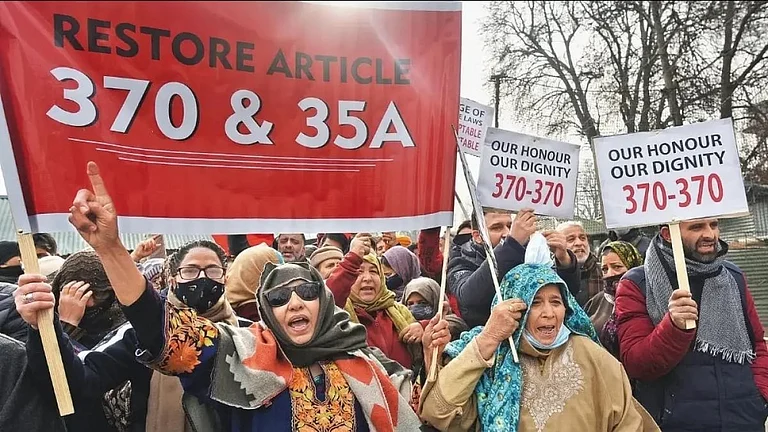Eight months after the abrogation of Article 370, two significant events unfolded in Jammu and Kashmir in March 2020. On March 13, the government released Dr Farooq Abdullah from detention under the Public Safety Act. When Dr Abdullah stepped out, he found himself in an uncharted political territory: Jammu and Kashmir was no longer a state but had been reorganised into a Union Territory. The legacy of his father Sheikh Mohammad Abdullah was being removed.
In January 2020, the Union Territory (UT) administration removed the “Sher-e-Kashmir” (Lion of Kashmir) title, a reference to Sheikh Abdullah, from the police medal for meritorious service. It was renamed the Jammu and Kashmir Police Medal for Gallantry and the Jammu and Kashmir Police Medal for Meritorious Service. The UT also removed Abdullah’s December 5 birthday from the list of public holidays.
Earlier, on March 8, former Peoples Democratic Party (PDP) leader and minister Altaf Bukhari announced the formation of the ‘Jammu and Kashmir Apni Party (JKAP),’ stating that “circumstances warranted the formation of a new political party.” The politics of the region was changing. From its inception, the National Conference (NC) and PDP labelled it the "King's Party."
Bukhari (64), who was Finance Minister of the PDP in the PDP-BJP government under Chief Minister Mehbooba Mufti, was joined by several political leaders: Vijay Bakaya, Rafi Mir (PDP), Usman Majid (former Congress MLA), Ghulam Hassan Mir (former Independent MLA), Javed Hussain Beg, Dilawar Mir, Noor Mohammed, Zaffar Manhas, Abdul Majid Paddar, Abdul Rahim Rather (all from PDP), Gagan Bhagat (BJP), Manjeet Singh, Vikram Malhotra (Congress), and Junaid Mattu (former NC, PC).
The formation of the Apni Party was the first major political initiative in Kashmir since the abrogation of Article 370, aiming to fill the political vacuum created by the detention of mainstream political leaders from the National Conference and the Peoples' Democratic Party, including three former chief ministers Dr Farooq Abdullah, Omar Abdullah and Mehbooba Mufti.
The Apni Party talked about the politics of realism and sought the restoration of statehood. The party’s role model was former Prime Minister Ghulam Mohammad Bakshi.
After Sheikh Mohammad Abdullah's arrest on August 9, 1953, Bakshi Ghulam Mohammad took over as Prime Minister of Jammu and Kashmir until 1964. Historically, the National Conference sees Bakshi as having betrayed Sheikh Abdullah.
Initially, the Apni Party leaders argued that Sheikh Abdullah was respected for his economic vision but it was Bakshi who implemented them and directed the economic destiny of J&K. They said Sheikh Abdullah realized in 1970 that nothing would change regarding J&K's destiny, leading him to make peace with New Delhi and return as Chief Minister of J&K.
On March 14, 2021, Bukhari led 24 party leaders delegation to meet Prime Minister Narendra Modi in New Delhi.
According to the party statement of that day in the meeting, Bukhari thanked the Prime Minister for sanctioning a special package for the revival of the industrial sector in Jammu and Kashmir. “Bukhari reiterated his demand for the restoration of statehood to J&K and urged the Prime Minister not to delay the fulfilment of this commitment any further,” the statement adds.
The statement of the PIB of the day reads, “Prime Minister Shri Narendra Modi met a 24-member delegation from Jammu & Kashmir’s Apni Party led by Shri Altaf Bukhari at Lok Kalyan Marg in New Delhi.”
“In an interactive session, the Prime Minister called for Janbhagidari in transforming Jammu & Kashmir and emphasized on the importance of an administration that gives voice to the people. Prime Minister also noted that the democracy in the region could be strengthened through a fast-moving process of political integration.”
“Prime Minister engaged with the delegation on various issues like concerns on demographic changes, delimitation exercise and grant of state domicile. Referring to his statement in Parliament, Prime Minister underlined that the Government will work with all sections of the population to realize the hopes of state hood for Jammu and Kashmir at an early opportunity.”
“Apni Party President Shri Altaf Bukhari noted that 5th of August 2019, when the decision to abrogate Article 370 and Article 35-A was taken, was a watershed moment in the history of Jammu & Kashmir.”
For nearly five years, the Apni Party positioned itself as a key player in Kashmir politics, claiming credit for introducing domicile laws. Its leader, Altaf Bukhari, even positioned himself as the future Chief Minister. However, the recent general elections have significantly altered the electoral map of Jammu and Kashmir. The National Conference won two seats in Kashmir, and independent candidate Engineer Rashid defeated Omar Abdullah in South Kashmir. Sheikh Abdullah is re-emerging in political discourse, with new books exploring his legacy, while Bakshi appears to have faded from discussions forever. Even the Apni Party seems to have overlooked him, as references to Bakshi have disappeared from their narratives.
The Lok Sabha results were a shock to the Apni Party. Two of its candidates, Mohammad Ashraf Mir and Zafar Iqbal Manhas, forfeited their deposits in Srinagar and the Anantnag-Rajouri seats in South Kashmir, respectively. Despite the BJP's decision not to field a candidate in the Rajouri-Anantnag constituency and openly supporting Manhas, he performed poorly. He trailed in the assembly constituency previously won by current Jammu and Kashmir BJP chief Ravinder Raina and failed to get a lead in his home Assembly segments of Shopian.
In North Kashmir, where the Apni Party supported the Peoples Conference, Sajad Lone finished in third place. Mohammad Ashraf Mir, a former two-time PDP MLA from Sonawar who had previously defeated former Jammu and Kashmir CM Omar Abdullah in 2014, also struggled. He failed to win a lead in his home Assembly segments of Lal Chowk.
Now, questions arise about the future of Bukhari’s Apni Party and Ghulam Nabi Azad’s Democratic Progressive Azad Party (DPAP), both of which were seen as alternatives to “dynastic politics” in Jammu and Kashmir. The Peoples Conference has become reclusive, with leaders Khurshid Alam and Basharat Bukhari rejoining the PDP. Earlier this week, the Apni Party experienced a setback when senior leader Usman Majid left the party. “I was a major stakeholder in the party. I thought it would bring some change, but I was disillusioned. I feel like I lost five years in the party,” Majid, a former Congress member, tells Outlook.
However, the Apni Party says, it is not falling apart. Apni Party vice-president Ghulam Hassan Mir tells Outlook people leave and join parties and it is natural in the political parties.
Mir says the party was formed when there was hopelessness and fear among the people. “Article 35A, Article 370 had gone, people were confined to their homes. There was fear of demographic change in J&K. People were frightened that they lose their jobs. We talked to the Prime Minister. We told him that you had removed Article 370 because it was your party’s manifesto but we also informed him that there are apprehensions of demographic change in Kashmir. And for the first time, the Prime Minister gave an assurance in writing that there will be no demographic change,” Mir says, adding that they fought for the domicile law ensuring the employment opportunities for J&K residents. “In the case of the land we also held discussions with the government and ensured that land should be sold and bought by domiciles only. This way we gave hope to people,” Mir says. Mir says in the absence of any political initiative they talked about the release of prisoners and also ensured meetings between families and prisoners. “Even if talk to people whether they faced any real difficulty after the abrogation of Article 370, they will say not much as we had ensured safeguards,” he adds. Mir says they couldn’t perform well in the elections as they couldn’t reach out to people in contrast to other parties, which have deep roots. “You will see in Assembly elections we will emerge as the strong stakeholder,” Mir says. Despite Mir’s optimism, many in the BJP are not hopeful of the Apni Party’s bright electoral future.
“It’s not only Altaf Bukhari; all the political arrangements New Delhi thought of post-2018, including with Altaf Bukhari, Sajad Lone, and the oldest warhorse of the country, Ghulam Nabi Azad, have failed,” Naeem Akhtar, a senior PDP leader tells Outlook.
“The policymakers in Delhi don’t go beyond the agenda of the party they serve. This policy of stripping constitutional guarantees in an hour, cutting the state into two, and transferring powers to the LG has failed,” adds Akhtar, who was jailed for a long time after the abrogation of Article 370.
“Now, what has been the cost-benefit ratio? The main point of abrogating Article 370 was to improve the security situation in Kashmir. Has the headache gone? Has the security challenge decreased, or has it increased? These are stark questions Delhi’s policymakers must ask themselves,” Akhtar adds.
“Another question they should ask is whether the decisions to exclude people from Chusul to Kathua from all life-changing decisions in a matter of an hour have proven right. It wasn’t just the event of August 5, 2019. It continues with orders of disempowerment every day,” Akhtar says.
The PDP leader has more questions.
“Are Pandits back in their homes? Is any Pandit ready to return? What was happening in the plains is now happening in the mountains of Jammu and Kashmir, perhaps in its worst form. And they are talking about applying the Kashmir model of counterinsurgency in Jammu,” the PDP leader adds.
“Bakshi Ghulam Mohammad was a giant of a man who did what New Delhi asked and was reduced to a footnote despite ruling J&K like a country for 11 years. Despite his contributions, no one remembers him, and no government deems it fit to provide security to his grave because it doesn’t need it. No one even remembers where it is. He inherited a government with strong emotional ties to Sheikh Abdullah, but when the time came, his entire edifice fell like a house of cards,” Akhtar says, asking Delhi to take a path of course correction in Jammu and Kashmir rather than exporting Kashmir model to Jammu.
“It’s time for cool introspection, and there is nothing wrong with course correction,” he says.


